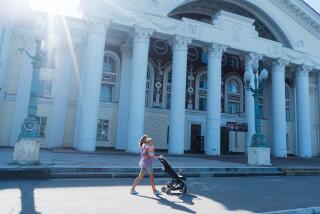Infamous Rasputin Revered as ‘Uncle Grigory’ in Home Town : Russia: Bizarre character started out as a horse thief and became a royal adviser blamed for the downfall of the last czar. His legend lives on despite Soviet campaign to erase his memory.
POKROVSKOYE, Russia — He was one of this century’s most bizarre characters--a wild-eyed, wilder-living mystic who started out as a horse thief and became a royal adviser blamed for the downfall of Russia’s last czar.
But in the dusty Siberian village where he was born, Grigory Rasputin is still remembered fondly as one pretty great guy.
“Uncle Grigory” was a generous benefactor who helped his neighbors, gave gingerbread to children and got a bad rap from history, residents of Pokrovskoye say.
“This image as an evil fool is not at all the way he was described to us,” said Raisa Zaborovets, a pensioner. “He may have been a strange person, but he was clever and he sympathized with the common people.”
The last living Pokrovskoye resident to have known Rasputin died two years ago.
But just as he proved difficult to kill off in 1916, surviving several assassination attempts until nobles poisoned, shot, beat, mutilated and burned him in St. Petersburg before dumping his body in a well, his legend survived a decades-long Soviet campaign to erase his memory.
The Communists exiled his relatives, razed his house and even destroyed the small dacha down by the placid Tura River where Rasputin reputedly entertained female admirers.
The spirit of the infamous “starets,” or self-styled holy man, endures in the form of a local look-alike, Rasputin tales that no longer must be whispered, even a very popular chair said to be imbued with his mystical force.
Rare visitors to the farming village of 2,000 people, a sleepy settlement of log cabins and small wooden houses, are stopped cold by the sight of Viktor Prolubshikov and his flowing mane.
A handyman who says his great-grandmother was Rasputin’s maid, he bears a startling resemblance to the mystic in his rough cotton tunic and tall black boots, with slicked-down hair parted in the middle.
With Rasputin no longer taboo, the 45-year-old Prolubshikov enjoys shocking the handful of tourists who find their way to the village 1,200 miles east of Moscow. He is eager to improve the healer’s battered historical reputation.
“There was no evil in him,” Prolubshikov says. “My grandfather told me he was a kind man who loved working on the land. And everyone agreed he had special powers.”
By the way, Prolubshikov adds earnestly, “I also have special powers. I, too, can heal.”
Rasputin’s strange powers, real or imagined, propelled the semiliterate peasant from hard-drinking petty criminal to adviser to Czar Nicholas II.
After acquiring a reputation as a healer in St. Petersburg, he somehow stopped the hemophilic hemorrhaging of the czar’s young son Alexei, heir to the throne. Czarina Alexandra, convinced that Rasputin was an emissary from God, brought him into the royal family’s inner circle and prompted widespread, published speculation that the two were lovers.
Acceding to his wife’s wishes and ignoring reports of Rasputin’s debauchery, Nicholas allowed the healer to appoint unscrupulous allies to high posts and gain undue political influence. Historians say his disastrous decisions doomed the monarchy and helped set the stage for the Bolsheviks to seize power in 1917.
Oddly, it was rock ‘n’ roll that revived Rasputin’s name throughout the Soviet Union.
A catchy song, “Rasputin,” by the Western group Boney M was allowed air time in the late 1970s and became a huge hit with silly lyrics like “Rah rah Rah-spoo-teen, Russia’s greatest love machine.”
Among those taken by the snappy tune was a teen-ager from the nearby oil town of Tyumen, Vladimir Smirnov, who grew up to become a historian.
Hoping to lure tourists to Pokrovskoye, Smirnov opened a small Rasputin museum last year in a green-shuttered log house across the broad dirt road--Soviet Street--from where Rasputin’s home stood until 1980.
The holy man himself held religious gatherings in the cabin, which was his brother-in-law’s house. Now it contains such memorabilia as photographs, his birth certificate, an icon from his church, his old table and the chair that locals swear cures the impotence of men who sit in it.
(BEGIN TEXT OF INFOBOX / INFOGRAPHIC)
Village Tales
Fact or legend, tales of Grigory Rasputin abound in the home village of the man the world knew as Russia’s “mad monk”:
Communal garden: His grandfather took young Rasputin to visit a monastery, where he first felt religious urges. When they returned, Rasputin dug a hole in the garden and sat for days, absorbing Earth’s powers.
Female visitors: Admirers from peasants to noblewomen flocked to see Rasputin, as well as a woman who stabbed him in the name of women he had abandoned. Most women were entertained at a secluded cottage, complete with a special bath, that Rasputin built on the banks of the Tura River.
Wedding night: When a village youth said he wanted to marry but could not afford it, Rasputin sent him to buy everything he needed at Rasputin’s expense. In return, Rasputin claimed the first night with the bride.
Virgins’ hair: After Rasputin conquered a virgin, he reputedly cut off some locks of her hair and buried them in a box in the garden. When Communists razed his house in 1977, they unearthed many boxes containing hair.
Source: Associated Press
More to Read
Sign up for Essential California
The most important California stories and recommendations in your inbox every morning.
You may occasionally receive promotional content from the Los Angeles Times.









